Los Angeles Business Journal: Philanthropies increasingly support local news, news literacy
More than ever, philanthropies are funding ways to strengthen news at the local level. That focus will benefit students in Los Angeles, thanks to a three-year, $1.15 million grant to the News Literacy Project to support a partnership with the Los Angeles Unified School District.
“The News Literacy Project is recognizing that there’s been a shift in how people consume and interact with the news,” says Gerun Riley, who heads the Foundation. “We really want to make sure that young people develop the skills to be able to interact with news to differentiate fact from fiction and identify reputable and verifiable sources of news and use that news in a productive way.”
Read the Los Angeles Business Journal piece here. Read more about the Broad Foundation’s support for the News Literacy Project’s work with LAUSD here.
Inside Philanthropy highlights Broad Foundation award to News Literacy Project efforts in LA
News literacy efforts in California schools received a boost from the Eli and Edythe Broad Foundation in the form of a $1.15 million grant. The funds will support a partnership between the News Literacy Project and Los Angeles Unified School District through NLP’s News Literacy District Fellowship program. “Students are at a civic disadvantage if they aren’t taught how to be news literate and to engage with the news and information that they come across every day,” said Charles Salter, NLP president and CEO. Helping make it happen is California philanthropist Melanie Lundquist, an LAUSD grad and NLP board member.
Read the Inside Philanthropy piece here. Read more about the Broad Foundation’s support for the News Literacy Project’s work with LAUSD here.
NLP’s News Literacy District Fellowship program expands across U.S.
The News Literacy Project has selected nine school districts to join its growing News Literacy District Fellowship program — a nationwide initiative that supports education leaders to design and implement district-wide plans for news and media literacy education.
The program will potentially impact more than 1 million students across 13 states. The latest fellows are the third cohort in as many years represent districts of all sizes in urban, suburban and rural communities.
“Teaching news and media literacy to our students is no longer a supplemental skill, but a necessary one,” said Karin Ledford, librarian, Elk Grove Unified School District, California, a fellowship program participant. “Our teachers are eager to dive deep into media literacy skills, too, and are looking forward to us leading the way.”
Five California districts include Los Angeles
This 2024-25 cohort includes the Los Angeles Unified School District, the country’s second-largest, which will join four other California districts to create a blueprint for teaching all students news literacy skills before graduation that can be replicated across the state.
“Students are at a significant civic disadvantage if they are not taught how to navigate our current information landscape. Together with these districts, the News Literacy Project is leading a movement to ensure that young people learn to identify credible information and recognize falsehoods, so they graduate with the knowledge and ability to participate in civic society as well-informed, critical thinkers,” said Charles Salter, President and CEO of NLP.
The fellowship is a two-year program. Each district receives $20,000 and support from NLP through professional learning, curriculum guidance and a network of like-minded peers. Upon completion, fellows can apply to join an alumni network, demonstrating continued commitment to widespread adoption of news literacy education by mentoring and inspiring other school systems. This year’s cohort brings the total number of fellowships to 17.
“Through our fellowship and alumni programs, the News Literacy Project is sparking systemic change to public education at a national scale. Together we are paving the way for all students to graduate with news literacy skills, empowering students to think critically about information and preparing them to be active participants in our democracy,” said Shaelynn Farnsworth, director of the fellowship program.
The 2024-25 News Literacy District Fellowship cohort includes:
California
- Beverly Hills Unified School District
- Central Unified School District Fresno
- Elk Grove Unified School District
- Fremont Union High School District
- Los Angeles Unified School District
Florida
- Broward County Public Schools
Nebraska
- Kearney Public Schools, Nebraska
North Carolina
- Johnston County Public Schools
Oklahoma
- Norman Public Schools
NLP commits to systemic change in education
In my life before NLP, I was a middle school teacher, and later, a school district superintendent. These experiences were ideal preparation for doing the important work of ensuring news literacy is a national education priority.
In fact, there is a direct through line. Let me explain. When my eighth grade U.S. history students walked into the classroom, they would immediately see a large, colorful sign with one page of construction paper for each letter — THINK!
I would stand next to this sign each day and ask them questions. I didn’t realize it then, but I was challenging them to fill in the gaps of their education by asking them to think more deeply about their answers. At that time when test scores and test prep ruled the academic day, we weren’t expected to teach students to think critically. And we still don’t. That puts students at a disadvantage for life and fails a principal mandate of public education: to prepare students to be active, critically thinking members of our democracy.
NLP has led the way to help change this, and over the past year we’ve felt a renewed urgency to turn our full attention and resources to helping educators align what happens in the classroom with events in the real world.
I’m excited to announce that we have made a strategic pivot that tightens our focus on bringing systemic change to public education at a national scale. Our ultimate objective is nothing less than ensuring that news literacy becomes required teaching in all 50 states. As important and rewarding as our recent initiatives with the broader public have been, we knew we would have to restructure our work to fully leverage our expertise on this urgent initiative. Our strategic framework spells out how we will achieve this.
Partnering with Los Angeles school district
Earlier this week we took a major step toward this vision. With a three-year, $1.15 million grant from The Eli and Edythe Broad Foundation, we are partnering with the Los Angeles Unified School District (LAUSD), the second largest school district in the United States, to ensure that all students learn news literacy skills and concepts before high school graduation. LAUSD also will join NLP’s News Literacy District Fellowship program, a nationwide initiative that supports school leaders to design and implement district-wide plans for news and media literacy education that currently impacts over 1 million students in 13 states.
Together with LAUSD, we will pioneer a blueprint for news and media literacy education not just for California, but also for districts across the nation, as legislative efforts to require media literacy education gain momentum around the country.
Oh, and about that through line: As a young teacher I knew that my students didn’t need to take more tests to succeed in whatever path they chose. They needed to learn to think critically. I still believe this, and at NLP, we plan to make it happen.
NLP partners with LAUSD, Broad Foundation to create national model of news literacy learning
The Eli and Edythe Broad Foundation has awarded the News Literacy Project, the nation’s leading provider of news literacy education, a three-year, $1.15 million grant to support a partnership with Los Angeles Unified School District (LAUSD). The LAUSD is the largest independent school district in the United States, and the grant will ensure that all students learn essential news literacy skills and concepts before they graduate high school.
Through the partnership, NLP and LAUSD will pioneer a blueprint not only for districts in California seeking to align instruction with the state’s recent media literacy legislation, but also for others across the nation, as a growing number of states pass similar legislation.
“Students have a right to learn how to find information they can trust, share and act on, and they are put at a civic disadvantage for the rest of their lives if they don’t,” said Charles Salter, President and CEO of the News Literacy Project. “This partnership with The Broad Foundation and Los Angeles Unified School District will serve as a roadmap for school leaders across the country to follow and implement their own community-driven approach to news and media literacy instruction. Together, we can prepare the next generation to participate in civic life as well-informed, critical thinkers.”
Support indicates significance, urgency
This investment from The Broad Foundation represents the first time the organization has funded such a venture, marking the significance of the issue throughout the region. “Young people are growing up in an increasingly challenging and complex information landscape. The thoughtful and timely work of the News Literacy Project equips students with critical thinking skills so they can distinguish credible reporting from misinformation,” said Gerun Riley, president of The Broad Foundation. “Supporting NLP and LAUSD’s partnership is an important step in cultivating a healthy information ecosystem where L.A.’s students can find and use trustworthy information to make well-informed decisions and uplift our communities.”
Philanthropist Melanie Lundquist brought together the partnership among The Broad Foundation, LAUSD and NLP. “I am grateful to The Broad Foundation for their support of NLP and proud of LA Unified, of which I am an alum. This collaboration sends a strong message that in Los Angeles, our young people will be well-equipped to become active and informed citizens. This is not a partisan issue. The News Literacy Project sets the standard for impartial media literacy education, and that helps strengthen our democracy,” said Lundquist, who is the largest individual donor to NLP and a member of NLP’s Board of Directors.
LAUSD to join District Fellowship program
Beginning in the 2024-25 school year, LAUSD will join the News Literacy District Fellowship program, a nationwide initiative that supports school leaders to design and implement their own innovative, sustainable plans for news and media literacy education for all students in their districts.
“Protecting democracy starts in America’s classrooms, and I appreciate The Broad Foundation’s commitment to our students and teachers in advancing news literacy curriculum,” said LAUSD Superintendent Alberto M. Carvalho. “In addition to our recent investment of $2 million in state monies to support educators to develop content, we are pleased to partner with organizations like NLP to implement media literacy education across our District. This collaboration will set the standard for effective news literacy instruction in classrooms across the country.”
NLP provides professional learning for administrators and educators and curriculum resources such as The Sift® newsletter and Checkology®, an award-winning e-learning platform for teaching news literacy. To learn more, read about the work of educators in New Mexico who have just completed their fellowship.
New Mexico educators look to expand news literacy beyond their district
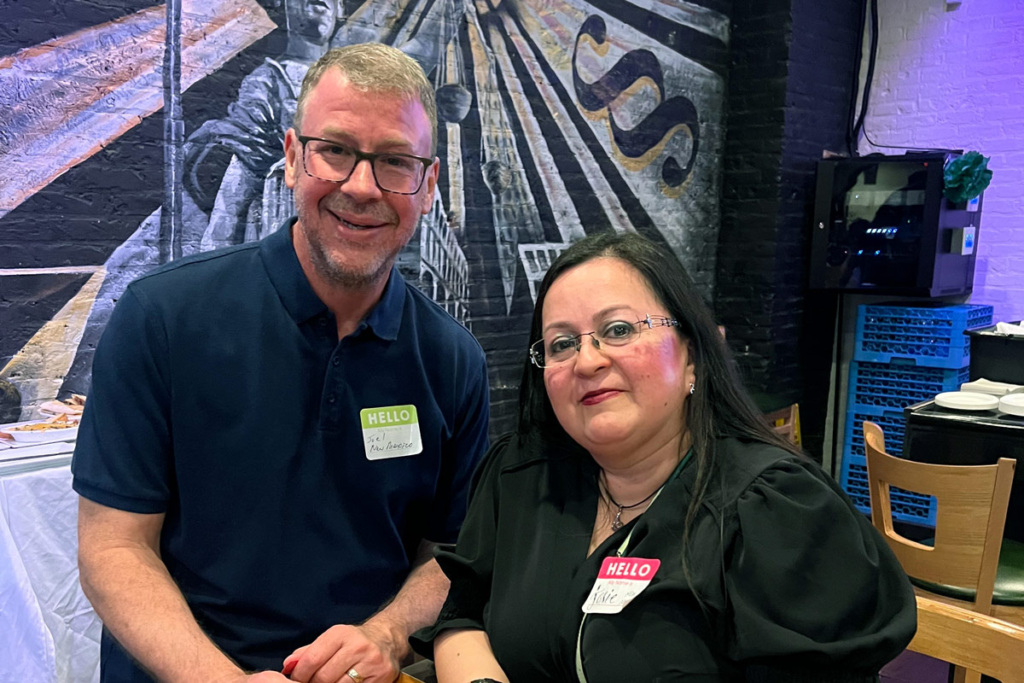
Joel Hutchinson and Josefina Miller at a News Literacy District Fellowship retreat.
For years, educators have had a front-row seat to the often-troubling impacts of the information technology revolution on their teaching and on young people. To help ensure their students can thrive in a world where misinformation pollutes a relentless stream of online content, a team of educators in Las Cruces, New Mexico, turned to the News Literacy Project.
“Media technology is shifting far faster than we can keep up with it. Most students are getting news from TikTok and other ‘news’ sources. This was driving our thinking,” said Joel Hutchinson, secondary English language arts content specialist for Las Cruces public schools, a district with 25,000 students.
In 2021, Hutchinson, secondary Social Studies Content Specialist Jamie Patterson, and middle school English language arts Content Lead Josefina Miller applied to NLP’s News Literacy District Fellowship program. They were accepted into the inaugural cohort in 2022.
During the two-year fellowship, districts partner with NLP to develop and implement innovative, sustainable initiatives to embed news and media literacy education in their schools. Shaelynn Farnsworth, director of the program, credits the Las Cruces team with involving cross-curricular leaders and support staff to tackle the challenge. “Right from day one they met regularly and built a plan. They are of one of our strongest fellowship districts and are a model for the state.”
The educators consider news literacy instruction an educational imperative and believe a lack of news literacy skills disempowers students. “It’s a necessity. We need to start as early as possible because we know that our students have access to all forms of technology at very early ages,” Miller said.
It starts with the teachers
Patterson noted how her son, age 5, likes to watch videos of tornadoes on YouTube and can’t tell what is fake and what isn’t. “It was a big ‘Aha!’ moment for me. He hasn’t even started school yet, and he’s already seeing these videos and everything else, and they’re forming what he understands about the world. And that’s a problem.”
But before they could roll out news literacy instruction, the team needed to provide teachers with the support to integrate it in their classrooms. They piloted professional development with a group of high school ELA and social studies educators, building much of the curriculum around NLP’s signature digital learning platform, Checkology®.
“We have teacher leaders who experimented and tried things out, and they’re now the ones that are helping us grow the program over the next few years,” Patterson said.
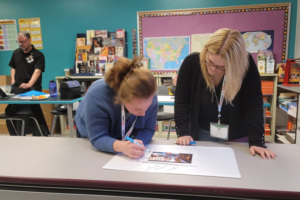 Las Cruces educators Megan Belch and Chelsea Lester participate in a critical observation exercise to vet the legitimacy of an image and its use at a professional learning event.
Las Cruces educators Megan Belch and Chelsea Lester participate in a critical observation exercise to vet the legitimacy of an image and its use at a professional learning event.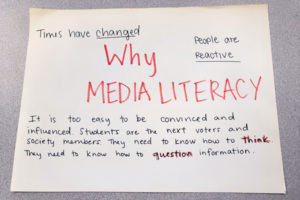 A poster created by a Las Cruces educator at a professional learning event.
A poster created by a Las Cruces educator at a professional learning event.The fellowship gave the educators the time and resources to focus and plan each step of the process, Hutchinson said.
“Because we had a preview with the pilot and the feedback from our colleagues, we can trickle down the skills from secondary level into middle school,” eventually incorporating news literacy instruction into elementary school, Miller noted.
News literacy instruction has been implemented in all Principals of Democracy classes, a course for upper grade levels, and it’s been written into the social studies curriculum guide for seniors. Students are introduced to news literacy at the start of the school year, and it is woven into class instruction throughout the year, so concepts are constantly reinforced.
Looking beyond their borders
What also sets the Las Cruces fellows apart is their vision of establishing news literacy education as a priority for all students in New Mexico, Farnsworth said. “They are working at the regional and state levels to help inform legislative decisions.”
And the educators hope to continue to advocate for news literacy at home while also assisting other districts as participants in NLP’s News Literacy District Fellowship Alumni program.
To have a meaningful impact, this work can’t start soon enough, the educators say. “What success would look like is to see this as a common practice, just part of the conversation. If we want to prepare kids for tomorrow, you’ve got to be thinking about tomorrow,” Patterson said.
Fellowship Highlights
- The Las Cruces fellowship team built on government momentum after New Mexico directed the Department of Education to develop and implement plans to include professional development for teaching digital citizenship, of which news literacy is a component. Among the efforts:
- Hosting and presenting at statewide ed tech and social studies conferences.
- Working with civic groups, such as The League of Women Voters, to advocate that news literacy is essential for a robust democracy.
- Las Cruces educators created fellowship digital portfolios documenting their implementation of news literacy instruction into their teaching, including:
- News literacy professional learning.
- Classroom and student achievement.
- Plans for continued implementation.
Utah school district develops a model for news literacy professional learning
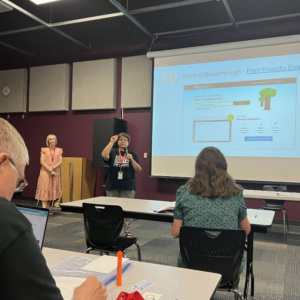 When it comes to natural beauty, Utah’s landscape never fails to impress. If you’re looking for that same reaction to the news literacy landscape, Utah’s Canyons School District delivers.
When it comes to natural beauty, Utah’s landscape never fails to impress. If you’re looking for that same reaction to the news literacy landscape, Utah’s Canyons School District delivers.
The school system created a professional learning initiative for teaching media and news literacy through NLP’s District Fellowship Program that has become a model for the state. “They have done a great job planning for a districtwide news literacy initiative. They have great district leads, discipline leads and educators who see news literacy education professional learning as their responsibility,” said Shaelynn Farnsworth, NLP’s senior director of education partnership strategy.
“We were already in discussion about how to improve information literacy, and NLP was an obvious choice for the partner,” Gretchen Zaitzeff said. She is the district’s library media specialist.
Hard work and serendipity
Lesli Morris, high school ELA specialist and a member of the district’s information literacy team, said Zaitzeff got the ball rolling. “Gretchen was at the forefront. She started us thinking about information literacy.”
Through Zaitzeff’s impetus, simultaneous efforts across the district and a dash of serendipity, the program fell into place. Morris became a member of NLP’s News Literacy Ambassador Program, which supports educators doing news literacy work in their communities. Utah passed legislation requiring civics education that included an information literacy component. (Retired teacher and school principal State Rep. Dan N. Johnson sponsored the legislation.) And the state awarded Jodi Ide, a high school social studies specialist, a competitive $250,000 grant for professional learning, which is part of the civics education legislation.
Support at the state level
The district also has a strong supporter at the Utah Department of Education in Davina Sauthoff, library media specialist lead. “Davina is a huge advocate of our work,” Farnsworth said.
Sauthoff said the district’s approach sets it apart. “I love how Canyons is building the capacity of information literacy skills with all educators, not just librarians or ELA teachers,” she said. “It’s a unique model to intentionally include all content area teachers from kindergarten through high school. I’m very excited about that.”
The initial year included 110 middle and high school educators in social studies and ELA, as well as teacher librarians and instructional coaches. They met in person or worked online asynchronously for eight months, voluntarily. This fall, secondary educators in all disciplines are participating. And next year, the program will expand to include elementary educators. That means teachers across grade levels and subjects in the 33,000-student district can join.
Sauthoff said Canyons’ program has inspired other districts that want to create similar initiatives. “Every district can choose to integrate news and media literacy the way they want. We find it important that districts build what makes the most sense for their communities,” she said.
Empowering educators
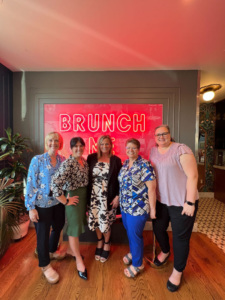 The response to the first year was overwhelmingly positive. Teachers read ahead in coursework and shared resources in school and with their families. Educator feedback indicated an interest in continued support and resources, which the team is incorporating.
The response to the first year was overwhelmingly positive. Teachers read ahead in coursework and shared resources in school and with their families. Educator feedback indicated an interest in continued support and resources, which the team is incorporating.
“This needs to be something built with a structure for sustaining it because this is essential to saving democracy,” Ide said.
Morris, the ELA specialist, agreed. “Our democracy will not survive if our citizens are not making accurate, informed decisions,” she said. “People act on the information they have. If they have poor information, their decisions might be poor.”
News Literacy Ambassador Program welcomes six new educators
The News Literacy Ambassador Program is a national initiative to mobilize educators in the fight against misinformation and is a key component of NLP’s NewsLitNation, a network of news literacy educators. Ambassadors are essential to NLP’s effort to build a more news-literate nation, and, in turn, a more robust, equitable democracy.
Ambassadors work at the grassroots level in their communities, organizing colleagues and allies to help advocate for news literacy education. Their work is critical to turning NLP’s mission into a movement with a transformative impact on young people around the nation.
“Educators around the country often feel like they are alone in this journey, so being able to connect with a fellow educator who can relate to their experiences, knows the local education landscape and has the expertise needed to help them succeed helps empower and expand their capacity,” said Miriam Romais, director, NewsLitNation. “The ability to recognize credible information is a critical life skill, and in many areas of the country teachers lack access to quality teaching resources that are free and nonpartisan. We aim to help fill that gap.”
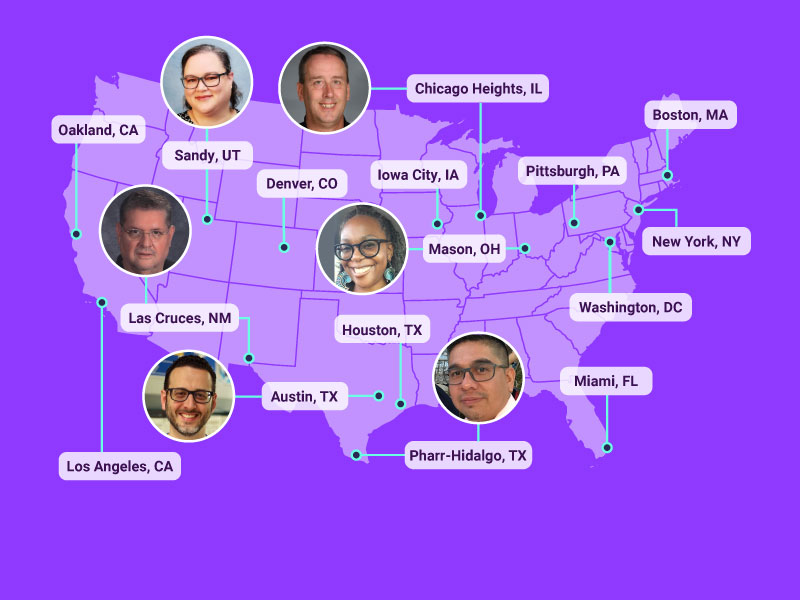
NLP has expanded this program to 16 ambassadors, recently welcoming six educators in key states from Ohio, Illinois, New Mexico, Texas and Utah.
Meet our new ambassadors below and visit NewsLit Nation to learn more about the entire group.
Juan Alvarado, high school ELA Educator, Texas
Juan was born and raised in San Luis Potosi, Mexico, and emigrated to South Texas with his parents in 1988. He teaches at Valley View High School in Pharr-Hidalgo, Texas, as an English, STEM and Pre-AP teacher. In 2017 Alvarado became the high school journalism and ready-writing coach, and one year later his students won the first-ever Academic District Championship title in journalism.
Juan Armijo, director of social studies, New Mexico
Juan teaches AP United States government, as well as politics and principles of democracy, at Mayfield High School in the Las Cruces Public Schools System. He has participated in the development of the new Social Studies Standards and Benchmarks (High School Civics) for the state of New Mexico and was part of the Materials Review Institute for the adoption of a new social studies textbook.
Jocelyn Burlew, learning experience designer, Ohio
Jocelyn uses culturally responsive practices to cultivate a classroom environment that places students at the heart of the learning process. She taught fifth grade English Language Arts and middle school social studies. She recently designed a middle school elective focused on digital, information and media literacy to help students become competent, literate, informed participants in society.
David Doerr, high school journalism and career and technology education teacher, Texas
David has taught journalism and career and technology classes in the Austin Independent School District since 2010, serving as a faculty adviser for student publications. He is the chair of the Texas Association of Journalism Educators’ Legislative Committee and Policy Committee. TAJE supports the efforts of scholastic journalism by providing conventions, contests and resources to teachers and students.
Lesli Morris, ELA teacher, Utah
Lesli is a high school ELA teacher and instructional system design specialist for Canyons School District in Sandy, Utah. She has taught high school in a variety of settings — from youth in custody to a National Blue Ribbon high school. One of her goals is to relentlessly promote diversity and pursue equity in education through access to quality curriculum and by supporting teachers with research-based instructional practices.
Sean Scanlon, director of curriculum, Illinois
Sean, who has a master’s in educational leadership, is the director of curriculum and instruction at Marian Catholic High School in Chicago Heights, Illinois. He created the Catholic EdTech Summit and hosted EdCamp Chicago. His passion is to help teachers integrate technology in ways that can engage students, while also helping them navigate the ever-shifting landscape of news literacy.
Mission to movement: Quarterly updates on NLP’s movement building work
September – December 2022
Each quarter, the Movement Building work updates will keep you in tune with the efforts of NLP and our educator network toward making media literacy education a priority across the U.S. and creating a future founded on facts.
Our community of invested supporters enables NLP’s work, both inside and outside of the classroom. This commitment and interest allow us to continue to influence the media literacy landscape and fuel an achievable national initiative that equips people of all backgrounds with knowledge and skills to be active, informed participants in civic life.
Jump to:
Movement Builders in the Field
Media Literacy Education Landscape.
Movement Builders in the Field
NLP’s NewsLitNation News Literacy Ambassadors and district partners defend democracy and promote news literacy in their classrooms and at the school district level.
District Fellowship program
NLP’s District Fellowship program brings together district leaders to build a sustainable and actionable plan for news literacy education implementation in their districts. During their two-year commitment to this program, fellows perform a needs-assessment and identify the grades and disciplines in their districts best suited for news/media literacy integration. They then work with NLP to create a scalable implementation plan.
- Check out the new District Fellowship program webpage! Here, you can explore more about how our fellows are affecting media literacy education at the district level.
- We selected and met with the first fellowship cohort of 17 district leaders from five school districts in July, and since then each district has developed a working team of up to 10 people from within their districts. They have been determining which grade levels and discipline areas they want to target for their news literacy instruction implementation plan.
- To date, we have held three all-cohort convenings and each district has met one-on-one with NLP staff (all meetings to date have been virtual). In August, the cohort met with CEO Chuck Salter and Peter Adams, our senior vice president of research and design, to learn more about NLP’s vision and mission and the design of NLP’s news literacy instruction resources.
- The next all-cohort meeting was held in October, and NLP staff conducted a training on best practices for communicating within their districts and communities about the importance of news literacy instruction.
Ambassador Updates
The News Literacy Ambassador Program supports local community organizing efforts to fight misinformation and pursue a mutual objective of creating a more news-literate generation of news consumers. Connect with an ambassador near you for events, presentations and to discuss the unique needs of educators in your school district or region.
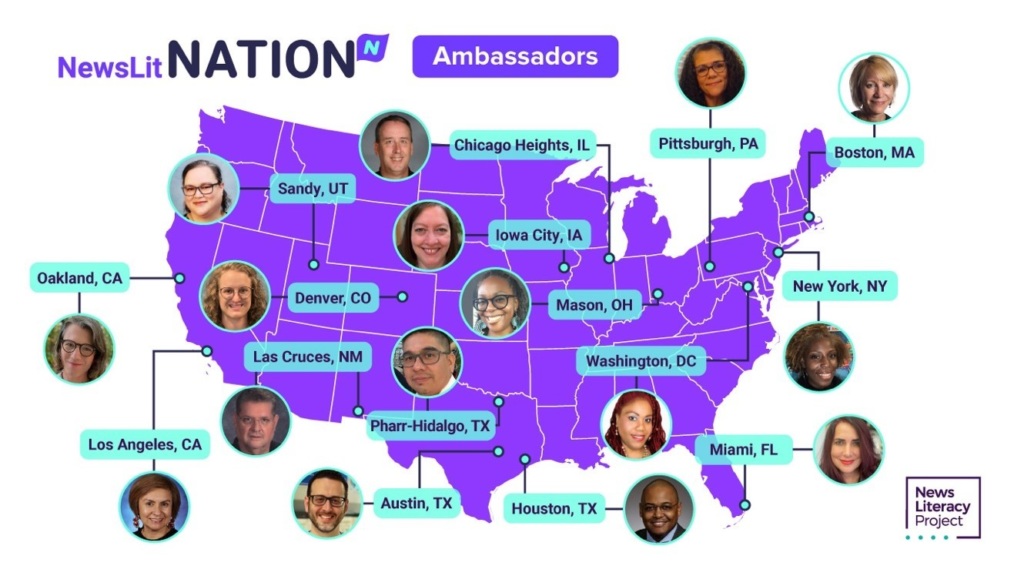
- Six new ambassadors were added to the program, expanding it to a total of 16 news literacy ambassadors around the country! New ambassadors include:Juan Armijo (NM) Grade 9-12 – Civics, Govt, History, Social Studies
Jocelyn Burlew (OH) Grade 6-8 – History, Digital/Media Literacy
Lesli Morris (UT) Grade 9-12 – English/ELA
Sean Scanlon (IL) Grade 9-12 – Administrator, Social Studies
David Doerr (TX) Grade 9-12 – Journalism / Photojournalism, Digital Media, Graphic Design, Newspaper Production
Juan Alvarado (TX) Grade 9-12 – English/ELA.
Read more about the six new ambassadors here.
- TX ambassador David Doerr presented his first news literacy event in October at The Texas Association of Journalism Educators Fall Conference in San Antonio, Texas.
- PA Ambassador Deborah Domingues-Murphy hosted a table at the Allegheny Intermediate Unit Social Studies Conference in October.
- NLP’s news literacy ambassador and librarian media specialist K.C. Boyd was honored at the School Library Journal (SLJ) Leadership Summit as the school librarian of the year in November.
- You can now find out more about PitchIt!, NLP’s student essay contest series, on our new landing page! Educators can use this resource for contest details, updates on contests cities, winners, insights from other educators, and more.
- The PitchIt! Miami student essay contest is open and will be live until May 12, 2023. The contest was recently launched district-wide by Miami-Dade County Public Schools.
- We are now hosting NewsLitNation Happy Hour engagement events at various conferences throughout the year to connect ambassadors with NLP staff in-person, and to recruit more educators to NewsLitNation.
- Happy Hour events have been hosted at the SLJ Leadership Summit, the National Council for the Social Studies Conference, and more, with over 100 educators engaged.
- You can now join over 900 fellow educators on the NewsLitNation Facebook Group!
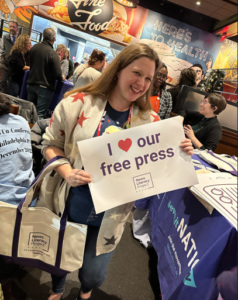
Texas Educator, Celaina Huckeba
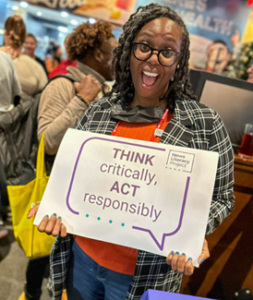
Ohio ambassador Jocelyn Burlew
Partnership Spotlight
- NLP’s Senior Manager of Educator Professional Learning Alexa Volland and Senior Manager of Education Partnerships (East Coast) Brittney Smith held a virtual professional development training for about 70 principals and assistant principals from Community School District 10 in the Bronx, New York, which serves 57 schools K-12.
- NLP partnered with Senior Planet from AARP and the National Institute for Civil Discourse to help the public survive Thanksgiving with the webinar, Productive conversations without confrontation. This virtual event had over 500 attendees!
- In December, NLP held a NewsLitCamp®, our professional learning event where teachers, librarians and other educators across all subjects connect directly with journalists and hone their ability to teach students how to sort fact from fiction. The event in Philadelphia was co-hosted with WHYY and The Philadelphia Inquirer.
- NLP’s Senior Manager of Community Learning DeMario Phipps-Smith traveled to Tyndall Air Force Base in Florida for a full-day training for instructors at the Non-Commissioned Officers Academy.
- DeMario is also cultivating NLP’s renewed relationship with Urban Rural Action.
- We have new partnerships in the works! These developing relationships include Sacramento County Office of Education, Ohio Department of Education, Atlanta Public Schools, New Jersey Department of Education, Spencer School District (IA), Alabama Department of Education, Cleveland, and Ohio Catholic Schools.
Media Literacy Education Landscape: Updates and Movement Wins
Through a partnership with Media Literacy Now, NLP receives monthly reports that provide a status update for all bills and laws related to media literacy, news literacy and digital citizenship in each state and at the federal level.
Current Landscape Snapshot
States mandating some form of media literacy education prior to graduation (Tier 1): Illinois, Texas, New Jersey
States currently providing funding for media literacy education (Tier 2): Colorado, New Mexico, Hawaii, California, Pennsylvania, Utah, Iowa, Florida, Ohio, Washington, Connecticut, and Michigan
Other states with statutes encouraging media literacy: California, Colorado, Connecticut, Florida, Hawaii, Massachusetts, New Mexico, Ohio, Rhode Island, Tennessee, Texas, Washington
Read more about the education landscape here.
Movement wins
New Jersey is now a Tier 1 focus among our priority educator engagement states!
This means that New Jersey schools will mandate some form of media literacy education prior to graduation.
New Jersey moved up in our ranks in late November when Governor Phil Murphy signed bill S588, making it the first state in the U.S. to mandate media literacy curriculums from kindergarten through grade 12.
“This bill ensures that 1.3 million public school students in New Jersey will be better prepared for life beyond school with key skills that help them with lifelong learning, civic participation, and work skills,” said Olga Polites, leader, New Jersey Chapter of Media Literacy Now and NLP partner.
Ebonee Rice, NLP’s senior vice president of educator engagement, applauded the development. “It is so important that students are equipped to confidently navigate today’s information landscape, and this is a great first step.”
June – August 2022
Each quarter, through these updates, we’ll keep you in tune with the work our network of educators is doing and how that work is shifting the media literacy education landscape across the U.S. to create a future founded on facts.
Our community of invested supporters makes NLP ’s work both inside and outside of the classroom possible. And our stakeholders’ commitment and interest allow us to continue to impact the emerging media literacy movement and fuel an achievable national initiative that equips people of all backgrounds for active civic life
Jump to:
Movement Builders in the Field
Media Literacy Education Landscape.
Movement Builders in the Field
NLP’s NewsLitNation News Literacy Ambassadors and district partners defend democracy and promote news literacy in their classrooms and at the school district level.
District Fellowship program
NLP’s District Fellowship program brings together district leaders to build a sustainable and actionable plan for news literacy education implementation in their districts. During their two-year commitment to this program, fellows perform a needs-assessment and identify the grades and disciplines in their districts best suited for news/media literacy integration. They then work with NLP to create a scalable implementation plan.
- NLP launched the application process and selected five districts to make up cohort one of the District Fellowship program:
- Canyons School District in Sandy, Utah.
- Greater Albany Public Schools in Albany, Oregon.
- Iowa City Community School District in Iowa City, Iowa.
- Las Cruces Public Schools in Las Cruces, New Mexico.
- North Salem Central School District in North Salem, New York.
Ambassador Updates
The News Literacy Ambassador Program supports local community organizing efforts to fight misinformation and pursue a mutual objective of creating a more news-literate generation of news consumers. Connect with an ambassador near you for events, presentations and to discuss the unique needs of educators in your school district or region.
- In June, with the help of news literacy ambassador Amanda Escheman, NLP, the Colorado Education Association and the Colorado Sun wrapped up a cosponsored three-part web series designed to help teachers navigate news literacy curriculums. Watch all three webinars here!
- For the 2021-22 school year, NLP’s ambassadors held 26 events — workshops, webinars, presentations, panel discussions, student contests and community meetings — reaching 3,828 educators and librarians. This represents more than four times the number of educators reached last year.
Partnership Spotlight
- Miami-Dade County Public Schools and NLP hosted the PitchIt! essay writing contest to empower students to be civically informed and engaged. Essay topics covered some of the most important issues of our time and explored how students can help combat misinformation or work to protect freedom of the press. Over 100 students participated, with 15 finalists and eight winners.
- In partnership with the New York City Department of Education, NLP held a PitchIt! contest with 100 student participants. Read more here.
- NLP is a Flip Discovery Partner! Flip (formerly known as Flipgrid) by Microsoft is a social learning platform that allows educators to interactively explore lessons and resources and share them with students. NLP’s education team has developed 77 topics and 9 collections on Flip for educators, resulting in over 147 hours of video response engagement with members of the Flip community. Check it out here.
- NLP’s research and design team collaborated with our partner, the New York Department of Education’s Civics for All team to create a Confirmation Bias & Motivated Reasoning infographic to be shared in schools and classrooms across the district. Check it out here.
- We’re expanding! Our most recently secured partnerships include the Oregon Department of Education, Washington Office of Superintendent of Public Institution, Forward Learning of Puerto Rico and Hawaii Department of Education.
Media Literacy Education Landscape: Updates and Movement Wins
Through a partnership with Media Literacy Now, NLP receives monthly reports that provide a status update for all bills and laws related to media literacy, news literacy and digital citizenship in each state and at the federal level.
Current Landscape Snapshot
We’ll keep you up to date on the latest district, state and federal media literacy education standards changes.
States mandating some form of media literacy education prior to graduation: Illinois, Texas
States currently providing funding for media literacy education: Connecticut, Michigan, New Mexico, Utah, Washington
Other states with statutes encouraging media literacy: California, Colorado, Connecticut, Florida, Hawaii, Massachusetts, New Mexico, Ohio, Rhode Island, Tennessee, Texas, Washington
Read more about the education landscape here.
Movement wins
Los Angeles Unified School District is a longtime partner of NLP and recently identified news and media literacy as an essential skill for all students, grades K-12, and as a graduation requirement as part of Critical Mass Media studies. The district has designated NLP’s Checkology® virtual classroom as a preferred curriculum to acquire these skills. Dharma Hernandez, coordinator of professional development design, Division of Instruction, meets monthly with NLP’s senior director of partnership strategy to determine next steps to ensure a successful district implementation of NLP resources and programs. She advocates for Checkology in the district and has begun conversations with the Science and STEM departments to include our new set of lessons.